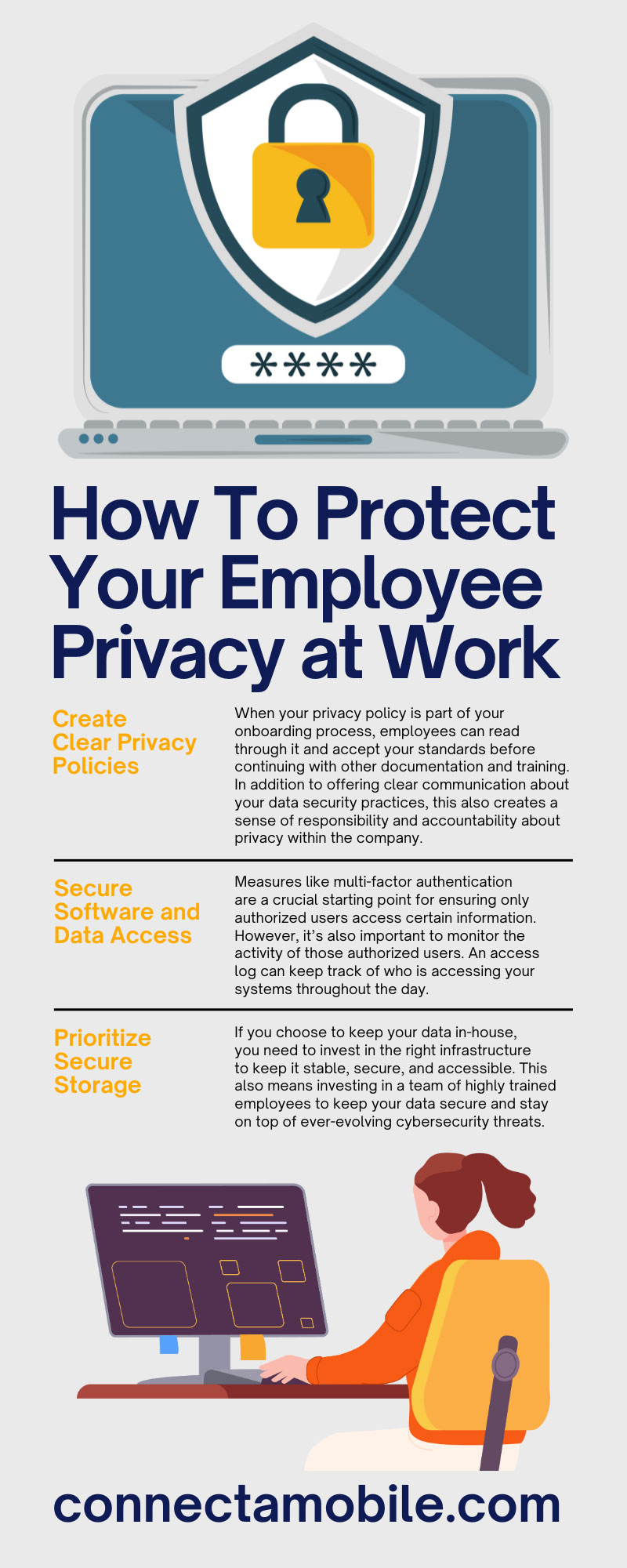Businesses that don’t prioritize cybersecurity put their most confidential data at risk every day. This means their employees are vulnerable, too. Employee data contains sensitive information—including social security numbers, background checks, medical records, bank information, and more—about every single person at your company. Scammers who gain access to this data can use it to impersonate employees, steal money, commit social security fraud, and plan personal attacks against your workers.
Protecting employee data is just as important as protecting customer information or other business assets. By implementing clear and robust data security practices, you keep your workforce safe while protecting all other company information. Learn how to protect your employees’ privacy at work and establish strong cybersecurity measures with these strategies.
Create Clear Privacy Policies
A privacy policy is the first step to any security practice. Your privacy policy sets a standard for your business, giving you a clear and accessible foundation for your rules, practices, and values regarding data privacy and cybersecurity. Many companies use their privacy policies to remain transparent with clients about data usage. However, it’s also useful for establishing transparency and trust with new employees.
When your privacy policy is part of your onboarding process, employees can read through it and accept your standards before continuing with other documentation and training. In addition to offering clear communication about your data security practices, this also creates a sense of responsibility and accountability about privacy within the company.
Secure Software and Data Access
Employee authorization and data access play a significant role in overall data security. Think about who has access to what information within your company. What do your different clearance levels look like? How do you enforce access controls to ensure only authorized users can view or alter sensitive data?
Measures like multi-factor authentication are a crucial starting point for ensuring only authorized users access certain information. However, it’s also important to monitor the activity of those authorized users. An access log can keep track of who is accessing your systems throughout the day.
Finally, be proactive about clearance changes. Whether you’re granting access to a newly promoted employee or revoking authorization from workers who have left the company, be sure to make those changes in a timely manner. You should also conduct annual assessments to review current employee authorization and clearance levels to ensure your system is always in good hands.
Prioritize Secure Storage
A robust and safe data storage system helps prevent security breaches and protects your information from unauthorized users. Both in-house and third-party storage solutions can effectively protect your data, but you need to make sure you’re investing in a dependable option that makes sense for your business.
If you choose to keep your data in-house, you need to invest in the right infrastructure to keep it stable, secure, and accessible. This also means investing in a team of highly trained employees to keep your data secure and stay on top of ever-evolving cybersecurity threats.
If you outsource this work, you won’t have to maintain an in-house team. However, you need to make sure you’re working with a reputable third-party data company that has the power and dependability you need to keep your information secure and accessible.
Protect Your Remote Workforce
If you have employees who work from home, you need to make sure your security measures extend to them. This means establishing practices that protect mobile devices and remote networks. If you can, ensure employees are working on separate, company-provided mobile devices to keep business information off personal phones, tablets, and laptops. Implement best practices regarding mobile device usage, including requiring strict lock settings and regular password changes, monitoring software and mobile app downloads, and enabling automatic updates to keep operating systems up to date.
Further protect your remote workers by establishing secure remote networks. Invest in virtual private networks so that employees can work with confidence and protect their communications and data no matter where they are.
Be Proactive With Employee Training
Strong cybersecurity measures require more than just comprehensive security software and technology. You also need comprehensive knowledge of digital security across your company.
Ongoing employee training helps employees understand the types of cyber threats they might face at work. Routine training modules that cover lessons about privacy practices, rules and best practices for remote work, and how social engineering scams work help keep your team knowledgeable and accountable. This reduces the risk of experiencing a security breach due to employee mistakes.
Be Careful With Third Parties
If you outsource business services—such as accounting, payroll, marketing, data storage, and so on—make sure you work with people you trust. This means choosing companies who will use their access responsibly. Look for business partners who uphold the same values of security, safety, and confidentiality that you do. These are the partners who will protect you, your employees, and your customers throughout the life of your partnership.
It’s also important to read reviews, ask questions, and set aside time to review your options thoroughly. An informed decision helps you set yourself up for success with the best third-party service available.
Keep Conversations Confidential
Conversations between employees and across your company often contain sensitive information. That’s why secure communications are a necessary part of protecting your employee privacy at work. Maintaining confidentiality across emails, messaging, calls, video conferencing, and other channels keeps knowledge, data, and other information safe. Secure your business communications through encrypted devices and reputable software solutions. Monitor access to make sure no unauthorized users are accessing your communication channels.
Keep Updating Privacy Practices
The world of cybersecurity is ever-changing. Even the best solutions become outdated and ineffective if you let them sit stagnant for too long. Continuous monitoring, assessment, and feedback gathering will help you improve security measures year after year. This allows you to stay on top of the latest industry and technological changes so you can continuously protect your business from threats of any kind.
Connecta Mobile helps businesses equip themselves with dependable mobile security solutions. Our encrypted mobile devices and private LTE network make data security both easy and dependable. Enjoy peace of mind alongside the efficiency and convenience of a robust mobile network when you switch to Connecta Mobile today.

